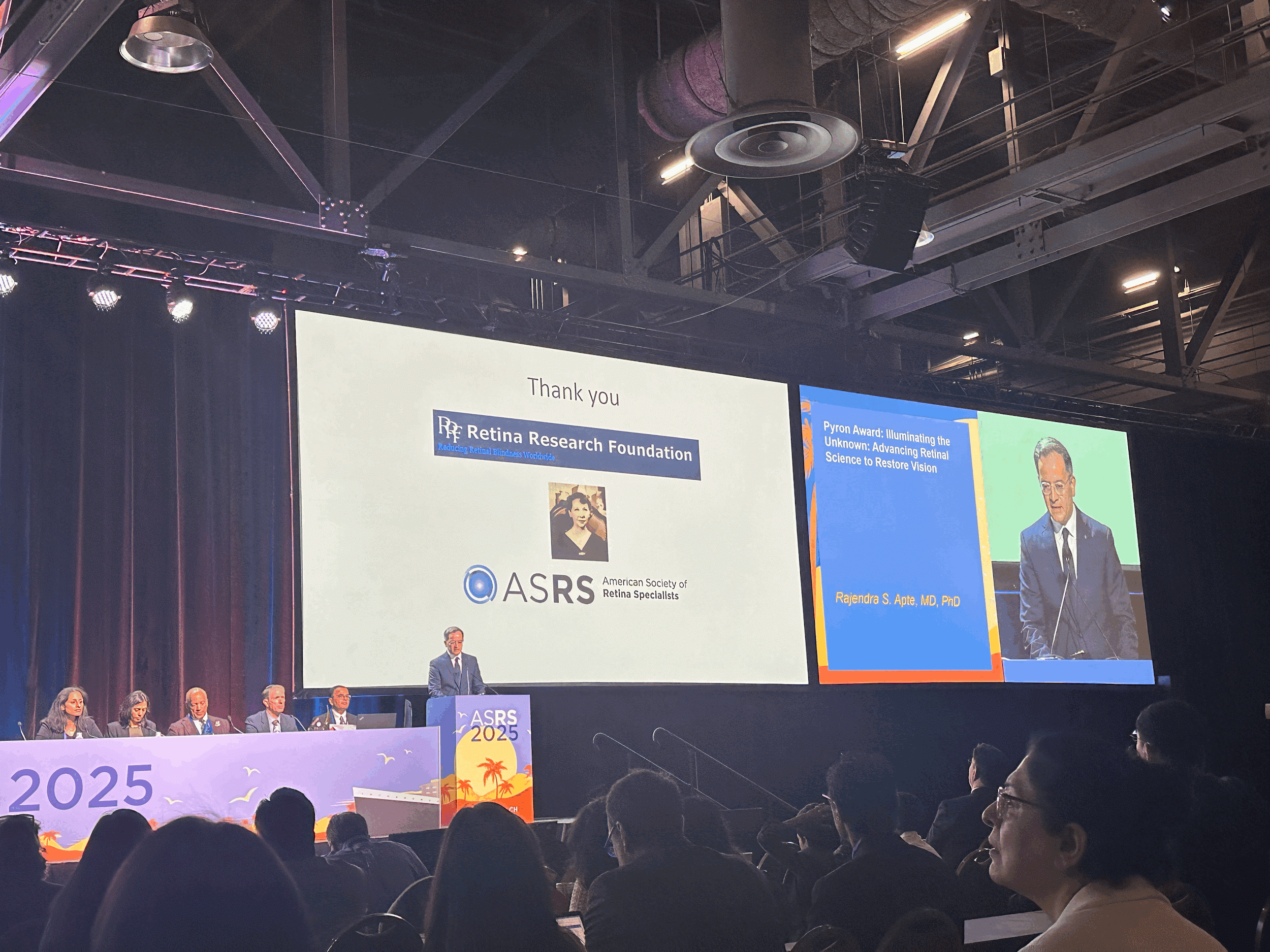Ashley Zhou, Edward Lu, Theodore Bowe, Luis Acaba Berrocal
Wills Eye Hospital, Philadelphia, PA
Celebrating innovation, mentorship, and legacy in the retina community
The 2025 American Society of Retina Specialists (ASRS) Annual Meeting’s Awards Ceremony brought together leaders from across the globe to recognize outstanding contributions to vitreoretinal surgery, science, education, and service. From pioneering surgical advances to paradigm-shifting clinical research, this year’s honorees exemplify the spirit of innovation and mentorship that defines the retina community.
Gertrude D. Pyron Award and Lecture
Recipient: Rajendra S. Apte, MD, PhD
Lecture Title: “Illuminating the Unknown: Advancing Retinal Science to Restore Vision”
Dr. Raj Apte, Paul A. Cibis Distinguished Professor at Washington University, was honored for his translational research linking aging, inflammation, and neurodegeneration to retinal diseases such as age-related macular degeneration, diabetic retinopathy, and glaucoma. His lecture traced the arc of discovery across three major themes: the plasticity of myeloid cells, cholesterol metabolism’s role in AMD, and neuroprotective strategies for the aging retina.
Dr. Apte’s insights—drawn from collaborative research spanning decades—have not only fueled scientific understanding but also inspired a generation of clinician-scientists. His closing message emphasized the collective power of the retina community: “We can stand on the shoulders of giants to do bigger and better things than we can do individually.”

ASRS Founders Award
Recipient: Jerzy Nawrocki, MD, PhD, FASRS
Lecture Focus: The Beauty of Inverted ILM Flap
A pioneering figure in vitreoretinal surgery, Dr. Jerzy Nawrocki was recognized for his development of the inverted internal limiting membrane flap technique, now a global standard for treating complex macular holes. In his lecture, Dr. Nawrocki detailed the evolution of the technique, which has shown up to 50% greater success in high myopia cases and has proved effective even in 25-year-old chronic holes.
His strategy with an emphasis on flap positioning, and application of scaffold biology exemplify innovation driven by logic, simplicity, and deep surgical insight. He concluded by affirming: “Most macular holes can be successfully treated with this method. These techniques are simple and logical and lead to better visual results.”
![]()
ASRS Presidents’ Young Investigator Award
Recipient: Rajeev H. Muni, MD, MSc, FRCSC, FASRS
Lecture Title: “From Gonin’s Theory to Machemer’s Vitrectomy and Back Again: Coming Full Circle in Rhegmatogenous Retinal Detachment Repair”
Dr. Rajeev Muni of the University of Toronto was honored for his visionary work in retinal detachment repair and noninvasive surgical innovation. His landmark PIVOT trial demonstrated superior outcomes with pneumatic retinopexy over traditional vitrectomy—findings now influencing practice globally.
In his lecture, Dr. Muni discussed a new technique, suprachoroidal viscopexy, a minimally invasive, in-office method for detachment repair that avoids gas, preserves photoreceptor integrity, and aligns with modern expectations of retinal healing. His closing challenge to surgeons asked: “Is single-operation reattachment enough? Or should we aim for more?”
![]()
The Packo Service Award
Recipient: Kevin J. Blinder, MD, FASRS
The Packo Service Award, established in honor of past ASRS President Dr. Kirk H. Packo, is presented annually to recognize exceptional service to the Society. This year’s Packo Award was given to Dr. Kevin Blinder and presented by Dr. Michael Jumper. Dr. Blinder has served on multiple committees, including as Chair of the Human Research Committee and as a member of the Education Committee. He has also contributed to the Research and Safety in Therapeutics (ReST) Committee, the Preferences and Trends (PAT) Survey, the Early Career Section, and the Fellowship Directors Section.
Dr. Blinder is also an active contributor to JVRD and serves on its editorial board. He is also a respected leader and mentor in the field, serving as Chair of The Retina Institute’s retina fellowship program, Co-Director of The Retina Institute Fellowship Program, and as a past President of both the American Diabetes Association and the St. Louis Ophthalmological Society.
Crystal Apple Award
Recipient: Sunil Srivastava, MD
The Crystal Apple Award recognizes excellence in teaching and mentorship. This year, the award was presented to Dr. Sunil Srivastava by Drs. Priya Vakharia and Avni Finn. Dr. Srivastava was recently named Chair of the Cole Eye Institute at Cleveland Clinic and has served as Director of the Cole Eye Vitreoretinal Fellowship since 2017. He has trained over 170 residents and fellows, further demonstrating his enduring commitment to teaching.
![]()
2025 M. Gilbert Grand ASRS Vitreoretinal Fellowship Award
Recipient: Jonathan B. Lin, MD, PhD
The M. Gilbert Grand Fellowship Award, established in honor of M. Gilbert Grand, MD, aims to expand access to fellowship training opportunities for second-year vitreoretinal fellows. This year’s award was given to Dr. Jonathan Lin and was presented by Dr. Reginald Sanders. Dr. Sanders highlighted several of Dr. Lin’s academic accomplishments, including being selected as a Heed Fellow and publishing over 40 manuscripts. His mentors describe him as a wonderful physician who prioritizes patient care above all else.
![]()
Retina Hall of Fame Award
Honoree: Lawrence A. Yannuzzi, MD
Recognition: Lifetime Achievement & Gabriel Coscas Lecture
A beloved figure in medical retina, Dr. Larry Yannuzzi was honored for his enduring contributions, both scientific and personal. With images of his family—wife Julie, children Nina, Todd, and Nico (a rising retina faculty at Bascom Palmer), and his grandchildren—the tribute highlighted his warmth and vitality.
Still actively lecturing and attending meetings, Dr. Yannuzzi most recently presented in Paris on NR2E3 and cone-rod dystrophies. The tribute recognized him as a foundational figure in retina who continues to inspire the field with his energy, insight, and humanity.
![]()